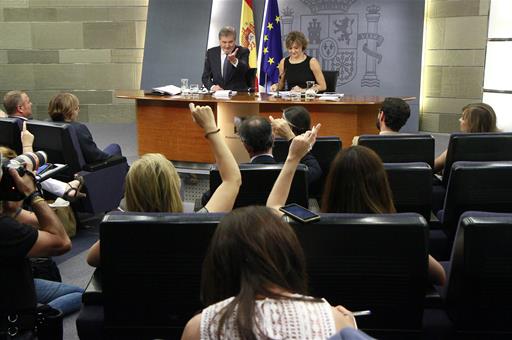Council of Ministers
Government approves new measures to alleviate drought
Council of Ministers - 2017.6.12
Moncloa Palace, Madrid
The Council of Ministers approved a Royal Decree-Law on urgent measures to combat the drought in several river basins.
The Minister for Agriculture and Fisheries, Food and Environmental Affairs, Isabel García Tejerina, explained that the accumulated rainfall since 1 October, when the hydrological year began, is 13% less than normal. Furthermore, this reduction is not distributed evenly and is more severe in the Duero river basin, at a level of 42% and in areas where rainfall is traditionally high, such as Galicia and the Cantabrian Coast. This deficit, she added, is lowering the water reserves, which stand at 57.2%, while the average for the last five years stands at 74.8% and for the last 10 years at 70.6%.
The latest assessment of the indicators shows that the Segura river basin is in an emergency situation and the Duero and Júcar river basins in a situation of alert. These three river basins are those that meet the requirements to set in motion the measures pushed through on Friday, which will be extended to any other river basin that is in the same circumstances, highlighted Isabel García Tejerina.
Savings for irrigators
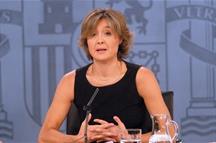 Pool Moncloa/JM CuadradoThe Minister for Agriculture specified the initiatives adopted in recent years in the Segura and Júcar river basins, with a drought declared since 2015, in order to minimise the social, economic and environmental impact. In the case of the Segura, the government approved exceptional measures that allowed more than 250 additional cubic hectometres to be mobilised without any restrictions on irrigation. In addition, more than 13 emergency works were carried out, with an investment in excess of 35 million euros. As regards the Júcar, almost 30 cubic hectometres were mobilised and more than 20 million euros invested in more than 10 emergency works.
Pool Moncloa/JM CuadradoThe Minister for Agriculture specified the initiatives adopted in recent years in the Segura and Júcar river basins, with a drought declared since 2015, in order to minimise the social, economic and environmental impact. In the case of the Segura, the government approved exceptional measures that allowed more than 250 additional cubic hectometres to be mobilised without any restrictions on irrigation. In addition, more than 13 emergency works were carried out, with an investment in excess of 35 million euros. As regards the Júcar, almost 30 cubic hectometres were mobilised and more than 20 million euros invested in more than 10 emergency works.
These actions are in addition to those contained in the Royal Decree-Law approved on Friday, 9 June. Given the situation of a lack of rainfall, pointed out Isabel García Tejerina, the necessary conditions exist to approve an exemption on the payment of fees and tariffs related to the availability of water resources. Consequently, irrigators will make a saving of 53.7 million euros.
As regards consequences relating to the Ministry of Employment and Social Security, a moratorium has been declared on National Insurance contributions. Companies and independent contractors that own agricultural holdings affected by the drought throughout the country will be able to obtain, after having substantiated the damage suffered, a one-year interest-free moratorium in the payment of their NI contributions. Isabel García Tejerina also announced that the government is working on a new form of financial aid for agriculture, designed for and adapted to those crops hardest hit by the drought.
The minister underlined that at this time "the supply for citizens is guaranteed in all the river basins", but that "it is the responsibility of everyone to make savings in their water consumption". Every drop always counts, but particularly now", she declared.
Protection for the health of smokers
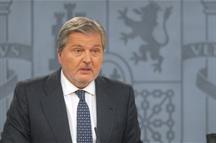 Pool Moncloa/JM CuadradoThe government approved a Royal Decree and reviewed a draft bill that seeks to culminate the transposition of the EU law on the regulation of the manufacture, presentation and sale of tobacco and related products, such as electronic cigarettes and herbal substances for smoking.
Pool Moncloa/JM CuadradoThe government approved a Royal Decree and reviewed a draft bill that seeks to culminate the transposition of the EU law on the regulation of the manufacture, presentation and sale of tobacco and related products, such as electronic cigarettes and herbal substances for smoking.
The Minister for Education, Culture and Sport and Government Spokesperson, Íñigo Méndez de Vigo, pointed out that the main aim is to help protect the health of smokers, including passive smokers.
Under the new regulation, electronic cigarettes and the liquids for recharges will have to carry health warnings. In addition, a system to monitor adverse effects will be established. As regards tobacco products, limitations will be introduced on their sale and supply, such as cross-border distance sales, and the sale of packs of less than 20 cigarettes will be prohibited.
Reconciliation of professional military personnel
The Council of Ministers amended the Regulation on the posting of military personnel in order to reconcile the professional, personal and family life of professional military personnel.
The regulation, according to Íñigo Méndez de Vigo, facilitates the reunification of the family in the case of married couples or civil partners when both are military personnel and establishes that the members of a married couple or civil partners who are both military personnel and have children under the age of 12 that are posted within the same province cannot be forced to take up a post in another province. It also provides for temporary postings in exceptional circumstances of reconciliation and updates the procedure for the mobility of victims of gender-based violence.
The government also granted 15 gold-ribbon Medals for Merit at Work, to 14 individuals and to the Spanish Federation of Business Organisations (Spanish acronym: CEOE).
Grand Cross of Order of Civil Merit
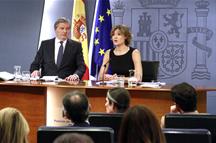 Pool Moncloa/JM CuadradoThe Government Spokesperson began the press briefing following the Council of Ministers by condemning the attacks on Saturday, 3 June on London Bridge and in Borough Market, responsibility for which was claimed by the Islamic State, in which eight people died and another 48 were injured. Among those murdered was the Spaniard Ignacio Echeverría, whom the Council of Ministers granted the Grand Cross of the Order of Civil Merit.
Pool Moncloa/JM CuadradoThe Government Spokesperson began the press briefing following the Council of Ministers by condemning the attacks on Saturday, 3 June on London Bridge and in Borough Market, responsibility for which was claimed by the Islamic State, in which eight people died and another 48 were injured. Among those murdered was the Spaniard Ignacio Echeverría, whom the Council of Ministers granted the Grand Cross of the Order of Civil Merit.
The minister said that "Ignacio has the affection, respect and admiration of all the people of Spain", and was an "exemplary citizen who, on that tragic night, was brave enough to stand up to the terrorists in an attempt to save the life of a young woman".
As regards Jihadi terrorism, Íñigo Méndez de Vigo declared that the law in force must be strictly applied and upheld, and "the principles and values that constitute the hallmarks of our societies", must be respected. He also called for "unity from all the political forces in regard to the values that make up our identity".
"It is necessary to work to raise social awareness when faced with such a serious threat to strengthen a clear social consensus. The police must be effective and count on more and better resources. We must improve international cooperation and strengthen the operations of the information and intelligence services", added the minister.
Catalonia
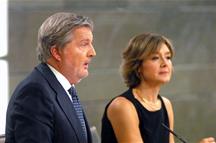 Pool Moncloa/JM CuadradoÍñigo Méndez de Vigo declared that the announcement made by the President of the Regional Government of Catalonia, Carles Puigdemont, to hold a referendum on Independence on 1 October is "a new step in a strategy that the government believes goes nowhere, a strategy that is increasingly more marginal, more unilateral and more radical".
Pool Moncloa/JM CuadradoÍñigo Méndez de Vigo declared that the announcement made by the President of the Regional Government of Catalonia, Carles Puigdemont, to hold a referendum on Independence on 1 October is "a new step in a strategy that the government believes goes nowhere, a strategy that is increasingly more marginal, more unilateral and more radical".
Friday's action, according to the Government Spokesperson, is "a spectacle that seeks to mask the solitude of its organisers and the isolation of each and every one of their actions", which shows that "their numbers are dwindling, that the only ones remaining now are the most radical members and that they have failed in all of their attempts to seek new allies in this path they have chosen to take".
"The Government of Spain wishes to remind Mr Puigdemont, his regional government and all of the institutions in Catalonia of their obligation to uphold the law, to protect the rights of all the citizens of Catalonia and to preserve the neutrality of public servants in Catalonia in complying with their day-to-day obligations and ensure that they cannot be forced to take on responsibility for the actions of others in challenging the rule of law", added Íñigo Méndez de Vigo.
The minister also recalled that, in accordance with the ruling of the Constitutional Court in February 2017, any preparatory action signed by the Regional Government of Catalonia or by any other Catalan institution is against the law and will have the corresponding legal consequences. "Let no-one have any doubts that any action that goes beyond the mere announcement of the events will be challenged by the government, as has each and every one of the attempts to challenge our legal system".
However, Íñigo Méndez de Vigo claimed that the government continues "to offer to embrace negotiations, without any conditions, provided that they are without any time restraints and that they fall within the bounds of the law". He also reiterated the government's "open invitation" for Regional President Puigdemont to attend the Lower House of Parliament, if he wants the proposed referendum to be legal, being as it is the only forum with the power to reform Articles 1 and 2 of the Constitution.
40 years of democratic elections
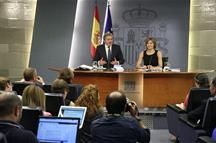 Pool Moncloa/JM CuadradoIn his political assessment of the week, Íñigo Méndez de Vigo highlighted that this week is the 40th anniversary of the first democratic elections. The minister underlined that this commemoration helps remind us of the values and the spirit of the Transition. "The generation of the Transition had the courage and the character to make policies that brought about understanding and that strengthened the basic national consensus".
Pool Moncloa/JM CuadradoIn his political assessment of the week, Íñigo Méndez de Vigo highlighted that this week is the 40th anniversary of the first democratic elections. The minister underlined that this commemoration helps remind us of the values and the spirit of the Transition. "The generation of the Transition had the courage and the character to make policies that brought about understanding and that strengthened the basic national consensus".
This major change, he highlighted, was the result of the reforms undertaken "in an ongoing process of construction, free from dogmatism and paralysing prejudices".
The Government Spokesperson maintained that "Spain now enjoys great international prestige", and is the country that is "growing the fastest and creating the most jobs in the Eurozone and it has a Welfare State with highly commendable levels in the quality of its public services". On this point, he argued that "in order to continue making progress, we must maintain those elements that work well, reform that which needs to be improved on whilst innovating on a continuous basis".
The minister pointed out that in 40 years, the Gross Domestic Product has multiplied by a factor of 16, per capita income by 12 and tourism, exports and social spending have increased considerably. He also mentioned the progress on infrastructures, telecommunications, healthcare, pensions and education.
On another note, Íñigo Méndez de Vigo announced that the President of the Government, Mariano Rajoy, accepted the invitation from the President of France, Emmanuel Macron, to attend a lunch at the Élysée Palace on 16 June to address bilateral issues, as well as national and international affairs, such as the summit to be held at the end of the month in Brussels.
Current affairs
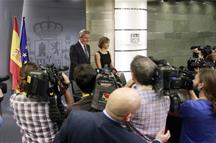 Pool Moncloa/JM CuadradoWhen asked about the government's assessment of the ruling handed down by the Constitutional Court annulling the 2012 tax amnesty, Íñigo Méndez de Vigo explained that the ruling is based on a "formal defect" because the legal figure of the Decree Law used was unsuitable. On this point, he recalled the circumstances under which the measure was adopted: "we were up to our necks in it", "on the verge of a bailout", and hence it was necessary to adopt, without delay, "exceptional measures" to tackle an "exceptional situation". This decision enabled more than 40 billion euros to be uncovered, stated the minister, as well as the fiscal regularisation of some 29,000 people, who, have been meeting their tax obligations since then.
Pool Moncloa/JM CuadradoWhen asked about the government's assessment of the ruling handed down by the Constitutional Court annulling the 2012 tax amnesty, Íñigo Méndez de Vigo explained that the ruling is based on a "formal defect" because the legal figure of the Decree Law used was unsuitable. On this point, he recalled the circumstances under which the measure was adopted: "we were up to our necks in it", "on the verge of a bailout", and hence it was necessary to adopt, without delay, "exceptional measures" to tackle an "exceptional situation". This decision enabled more than 40 billion euros to be uncovered, stated the minister, as well as the fiscal regularisation of some 29,000 people, who, have been meeting their tax obligations since then.
The Government Spokesperson also expressed the government's support for the Minister for the Treasury and Public Function, Cristóbal Montoro, who will appear before the Lower House, upon his own request, to provide the opportune explanations.
In regard to the effects of the results of the elections held on Thursday in the United Kingdom on Brexit, Íñigo Méndez de Vigo stated that the European Union is ready and willing to start the negotiations provided for under Article 50 of the Treaty of the Union, and highlighted the united position of the 27 members.





